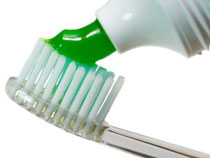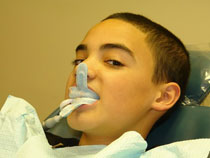Introduction
Both the Canadian Dental Association (CDA) and the American Dental Association (ADA) support the use of fluorides in dentistry as a safe and effective preventative measure against dental caries. Historically, fluoride as a decay preventative has been extensively researched for well over 50 years, and the research has been consistent in proving its safety and efficacy.
Humans ingest fluoride on a daily basis due to the fact that fluorides are found naturally in food and water and as an additive in public drinking water, toothpastes, and in oral prescriptions and rinses. So dentists must assess and account for these varied sources before considering any particular means of fluoride delivery to any individual, particularly children under the age of six, for whom over exposure can result in a condition of the teeth known as fluorosis.
Dental Fluorosis
Dental fluorosis is a change in the appearance of teeth and is caused when higher than optimal amounts of fluoride are ingested in early childhood while tooth enamel is forming. As long as the total daily intake of fluoride is maintained below specified levels, fluoride is a very important preventative measure in maintaining dental health of North Americans.
Both the CDA and ADA recognize the need to monitor the scientific literature with respect to levels of exposure to fluoride and general health to ensure the continued safe and effective use of fluorides in dentistry.

Fluoridated Toothpastes and Mouth Rinses
Both the American and Canadian Dental Associations acknowledge and support the use of fluoridated toothpastes and mouth rinses in the prevention of dental caries. The recommended usage of fluoridated toothpastes should be twice per day, with minimal rinsing of the mouth with water after brushing. In the case of children under 6 years of age, adult supervision during brushing is recommended, monitoring that only a small portion
(e.g. pea-sized portion) of fluoridated toothpaste be used, as excessive swallowing of toothpaste by young children may result in dental fluorosis. Children under 3 years of age should have their teeth brushed by an adult using only a ‘smear’ of toothpaste. It is further recommended that until the child develops the manual dexterity to properly brush their own teeth, an adult should supervise this activity.
Fluoride mouth rinses are an effective preventive measure for at risk individuals and should be used according to the specific needs of the individual. Fluoride mouth rinsing is not recommended for children under 6 years of age.

Dentist Delivered Fluoride Applications
The use of fluoride gels, foams and varnishes are recommended based on an assessment for risk for dental decay, history of dental decay, and consideration of facts such as whether the patient lives in community or area where the drinking water is not fluoridated.
Fluoride Supplements
Dietary fluoride supplements are available only by prescription in North America. They are intended for use by children living in non-fluoridated areas who are assessed as being at greater risk for dental decay. Supplementation, in these cases, are indicated in order to increase the level of fluoride exposure to levels similar to those of children living in optimally fluoridated areas.